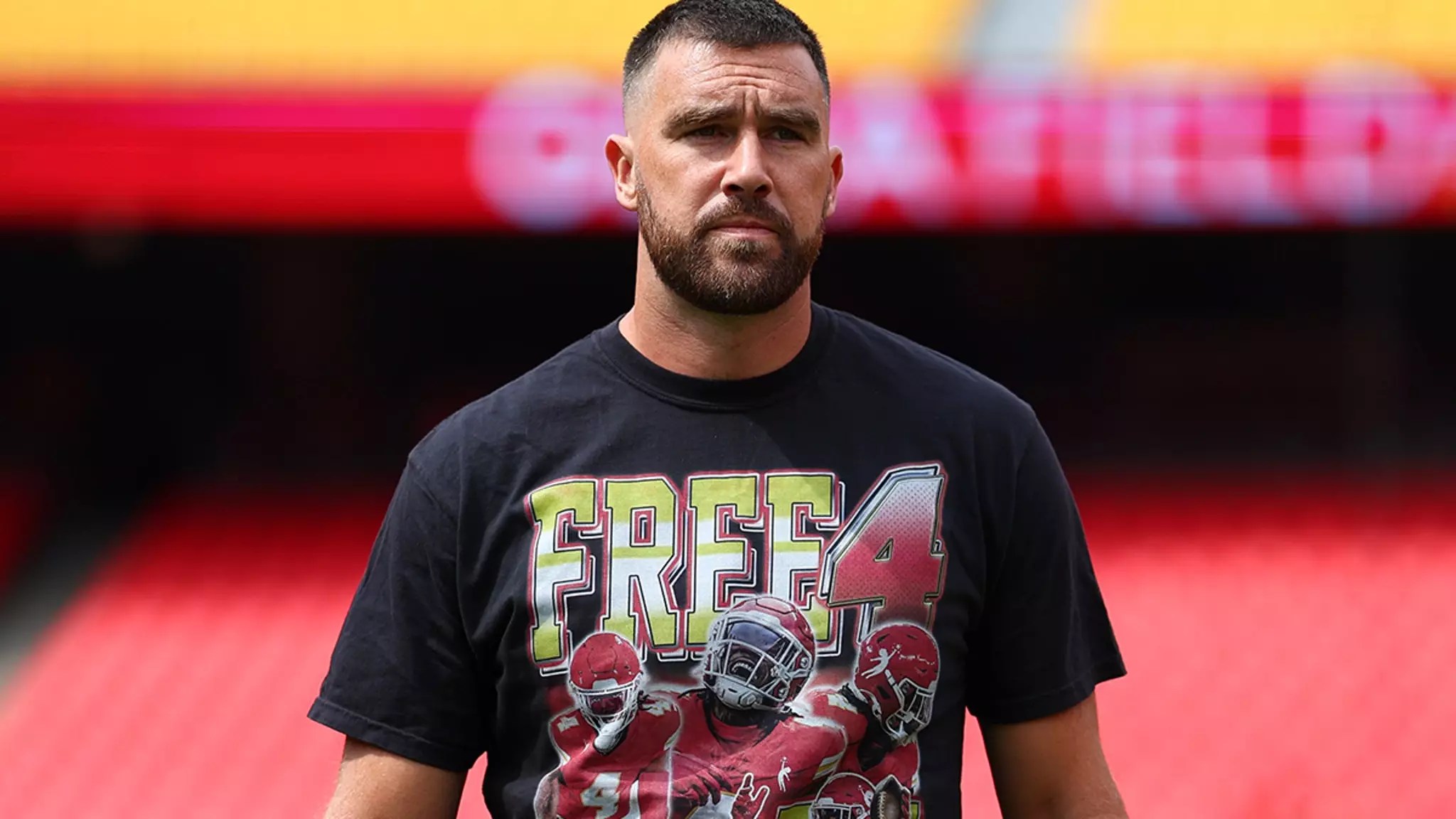In the high-stakes world of professional sports, personal expressions often intersect with public perception, sometimes igniting fierce debates. The Kansas City Chiefs’ players Travis Kelce and Tyquan Thornton recently found themselves at the epicenter of a storm—not for their on-field performance but for their pregame attire. Donning shirts that paid homage to Rashee Rice, a teammate suspended for a serious traffic incident, Kelce and Thornton appeared to support their fellow player in a way that many now interpret as tone-deaf or even reckless. Such actions reflect a broader tendency among athletes to blur the lines between camaraderie and insensitivity, raising uncomfortable questions about the messages they endorse publicly.
While team unity and loyalty are natural facets of sports culture, the decision to wear clothing that seemingly minimizes or trivializes a criminal act reveals hidden flaws in this solidarity. Instead of sparking positive dialogue or accountability, their attire has fueled indignation among critics, most notably from the victims’ legal representatives. In this case, the attorney representing one of the individuals injured in Rashee Rice’s infamous 2024 crash makes a compelling argument: support should translate into tangible acts of justice rather than superficial gestures of solidarity. Kelce and Thornton’s choice of clothing appears to bypass the uncomfortable reality—Rice’s actions had severe consequences, and his ongoing issues are not just a matter of personal reputation but of real human suffering.
The Real Cost of Support: Ethical Implications
At the core of this scandal is a fundamental misjudgment of what it means to back a teammate. Kelce’s “Free 4” shirt, intended possibly as a rallying cry, instead struck a discordant note with those who believe that true support involves accountability and responsibility. The lawyer’s pointed critique underscores a critical disconnect: wearing symbolic clothing doesn’t equal moral endorsement. Supporting a teammate isn’t about donning apparel that references a controversial incident but ensuring that justice and reparations are prioritized.
This incident invites a deeper discussion about athletes’ societal roles. Are players merely entertainers or responsible citizens who influence public values? Kelce’s choice to wear the shirt appears to demonstrate loyalty but also highlights a lack of awareness or concern about the broader implications. When celebrities leverage their platforms for support, they risk overstepping ethical boundaries, especially when their gestures could undermine victims’ rights or trivialize serious offenses. The lawyer’s sarcastic suggestion—wearing “Flee 4” shirts as a public service warning—serves as a stark reminder that statements of defiance or loyalty need to be paired with meaningful action, not just symbolic defiance.
The Appetite for Blind Loyalty and Its Consequences
Team dynamics often foster a culture of unwavering loyalty, yet this can dangerously eclipse moral clarity. Andy Reid’s casual dismissal, suggesting Kelce and Thornton merely wanted Rashee Rice to feel “part of it,” glosses over the seriousness of the issue. Such minimize criticism reflects a worrisome trend: team management can sometimes prioritize camaraderie over accountability, inadvertently endorsing a culture where missteps are overlooked.
Moreover, the fact that Kansas City remains winless without Rice this season underscores the team’s reliance on emotional bonds rather than strategic or ethical considerations. Should players support teammates at any cost, or is there a point where loyalty becomes a liability? Kelce’s and Thornton’s fashion statement, whether intentional or not, exemplifies how personal symbols can resonate beyond the locker room—impacting public perception and moral standing. In holding up Rashee Rice as a figure to support regardless of circumstances, they risk glamorizing recklessness and shirking critical reflection on accountability.
Reevaluating What True Support Means in Sports
Support in sports should be rooted in integrity and respect for justice, not superficial displays of allegiance. Kelce and Thornton’s wardrobe choices have inadvertently underscored a problematic narrative—that being ‘loyal’ might sometimes mean turning a blind eye to wrongdoing. Genuine support requires empathy extended into actions that promote healing, responsibility, and justice for victims.
The incident also unravels a broader societal issue: how public figures often prioritize reputation over moral substance. When athletes wear slogans or symbols linked to controversial issues, they risk sending mixed signals that can damage their credibility and influence. The path to genuine support might involve advocating for victims, promoting awareness, or engaging in actions that demonstrate true concern—rather than endorsing or trivializing harmful behaviors through clothing.
Ultimately, this controversy serves as a potent reminder that gestures of solidarity should be scrutinized with a critical eye. Support that lacks depth or empathy can come across as performative, risking more harm than good. If athletes genuinely wish to stand by their peers, they should consider whether their actions promote healing or hinder it—a lesson that transcends sports, touching on the very essence of moral leadership.







Leave a Reply